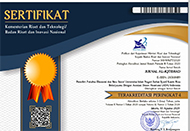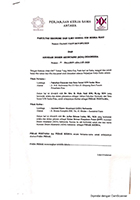MEASUREMENT OF ISLAMIC FINANCIAL LITERACY IN ISLAMIC FAMILY FINANCIAL MANAGEMENT : LITERATURE REVIEW
Abstract
Islamic Financial Literacy is an insight that a person has about Islamic financial products and services and is a type of sharia-based finance in Islamic life and law. This knowledge will ultimately have implications for a person's attitude in making economic decisions in accordance with Islamic values. This study discusses the indicators used in measuring Islamic financial literacy in Islamic family financial management using a structured systematic literature review methodology that uses 40 scientific articles indexed by Scopus and accredited by SINTA. The background of this study is because the statistics of divorces caused by economic problems show astonishing numbers. The measurement of Islamic financial literacy is also a combination of several qualitative and quantitative studies. The results of the study show that the indicators used in measuring Islamic financial literacy are zakat, deposits and loans in Islam, sharia insurance, sharia investment and household consumption. The purpose of this study is to provide an understanding of the importance of Islamic financial literacy related to the financial management of Islamic households, so that the goals of Sakinah Mawaddah Warrahmah Islamic households can be achieved.
Keywords
Full Text:
PDFReferences
Alquran dan Hadits
Ahmad, G. N., Widyastuti, U., Susanti, S., & Mukhibad, H. (2020). Determinants of the islamic financial literacy. Accounting, 6(6), 961–966. https://doi.org/10.5267/j.ac.2020.7.024
Ali, R. (2014). ZAKAT DALAM PERSPEKTIF EKONOMI ISLAM. 14(02), 144–150.
Arsyil, M. A. A., Fasa, M. I., & Suharto, P. (2022). Implementation of Family Financial Management during the Covid-19 Pandemic with a Sharia Economic Perspective. Journal of Law, Administration, and Social Science, 2(1), 13–21. https://doi.org/10.54957/jolas.v2i1.123
Djuwita, D., & Yusuf, A. A. (2018). The level of Islamic financial literacy among MSMEs and its impact on business development. Al-Amwal : Jurnal Ekonomi Dan Perbankan Syari’ah, 10(1), 105. https://doi.org/10.24235/amwal.v10i1.2837
Gustianingsih, D. A. (2022). Accounting model of harmonization of individuals in Islamic households. In Disertasi (p. 42).
Gustiningsih, DA,Mediaty, A. dan A. K. (2022). Wife ’ s Accountability in Islamic Household Accounting. 88–98.
Hadady, H., Bailusy, M. N., Pratama, R., & Fahri, J. (2021). Defining Financial Management Within Sakeenah Family. Society, 9(1), 302–318. https://doi.org/10.33019/society.v9i1.312
Herispon, H. (2018). ANALYSIS OF FACTORS INFLUENCING HOUSEHOLD DEBT BEHAVIOR (A LITERATURE REVIEW). Jurnal Ilmiah Ekonomi Dan Bisnis, 15(2), 89–101. https://doi.org/10.31849/jieb.v15i2.1156
Ignasius, R. (2021). Pengantar Asuransi ACA Asuransi. Galang Tanjung, 2504, 1–9.
Insani, A. I., Misfah Bayuni, E., & Anshori, A. R. (2020). The Effect of Sharia Financial Literacy on Financial Behavior of Students of the Faculty of Sharia. Prosiding Hukum Ekonomi Syariah, 6(2), 749–752. http://dx.doi.org/10.29313/syariah.v6i2.24631
Khotimah, H., & Saputeri, N. P. (2024). Jurnal Ilmu Perbankan dan Keuangan Syariah The Effect of Sharia Financial Literacy and Religiosity on Generation Z's Interest in Saving at Sharia Bank Introduction. 1(1), 71–86.
Muslichah, M., Putra, Y. H. S., Abdullah, R., & Usry, A. K. (2023). Islamic Financial Literacy and Financial Inclusion: Examining the Intervening Role of Financial Self-Efficacy. International Journal of Islamic Economics and Finance (IJIEF), 6(2), 181–200. https://doi.org/10.18196/ijief.v6i2.16384
Naefs, A., & Rr. Iramani. (2024). Testing the model of the tendency to owe in metropolitan communities. Mood, 36(1), 127–142. https://doi.org/10.24002/modus.v36i1.8529
Nanda, T. S. F., Ayumiati, A., & Wahyu, R. (2019). Sharia Financial Literacy Level: A Study on the People of Banda Aceh City. JIHBIZ :Global Journal of Islamic Banking and Finance., 1(2), 141. https://doi.org/10.22373/jihbiz.v1i2.8573
Nawi, F. A. M., Daud, W. M. N. W., Ghazali, P. L., Yazid, A. S., & Shamsuddin, Z. (2018). Islamic Financial Literacy: A Conceptualization and Proposed Measurement. International Journal of Academic Research in Business and Social Sciences, 8(12), 629–641. https://doi.org/10.6007/ijarbss/v8-i12/5061
Noor, M., Bin, B., Aizat, Z. U. L., & Hamdan, B. I. N. (2021). ISLAMIC FINANCIAL PLANNING ISLAMIC. Polytechni, 44.
Paledung, M., Nurdiyanti, D., Damayanti, R. A., & Said, D. (2023). Development Trends of Green Accounting Research: Systematic Literature Review. Jurnal Akuntansi Kontemporer, 15(2), 72–81. https://doi.org/10.33508/jako.v15i2.4366
Pardiansyah, E. (2017). Investasi dalam Perspektif Ekonomi Islam: Pendekatan Teoritis dan Empiris. Economica: Jurnal Ekonomi Islam, 8(2), 337–373. https://doi.org/10.21580/economica.2017.8.2.1920
Parhan, M., Taufik Rakhmat, A. T. R., Abyan Ashshidqi, M., Sylvia Dewi, L., Bunga Edelweis, S. L., & Regina Prayoga, F. (2022). Islamic Financial Planning: The concept of Islamic financial literacy as an alternative to financial planning for students. Islamic Economics, 13(1), 65–84. https://doi.org/10.22236/jei.v13i1.8417
Patrisia, D., & Abror, A. (2022). Sharia Financial Literacy in Generation Z: The Role of Family and Religiosity. Jurnal Kajian Manajemen Bisnis, 1(2), 1–15. https://doi.org/10.24036/jkmb.11687000
Probowati, D. E. P. (2021). Ecopreneur : Jurnal Ekonomi dan Bisnis Islam Akuntansi Dalam Pencapaian Tujuan Rumah Tangga Islami. 2, 62–80.
Rahman, F., & Arsyianti, L. D. (2021). Islamic Financial Literacy and Its Influence on Student Financial Investment and Behavior. Al-Iqtishad: Jurnal Ilmu Ekonomi Syariah, 13(2), 289–312. https://doi.org/10.15408/aiq.v13i2.22005
Ridwan M, D., & MA. (2013). The Handbook of Financial Family Planning “Mengelola Keuangan Keluarga Secara Islami” (F. Susanti (ed.); Cetakan I). UISU.
Roemanasari, F., Sabela, J., & Rusgianto, S. (2022). Islamic Financial Literacy and Financial Behavior on Investment Intention. Jurnal Ilmu Ekonomi Terapan, 7(2), 239–250. https://doi.org/10.20473/jiet.v7i2.40679
Salwa, D. K. (2019). Consumption Theory in Islamic Economics and Its Implementation. Labatila : Ilmu Ekonomi Islam, 3(1), 96–107.
Saputra, A. D., & Rahmatia, A. (2021). Islamic Financial Literacy Index of Students: Bridging SDGs of Islamic Finance. Economics and Finance in Indonesia, 67(1), 34. https://doi.org/10.47291/efi.v67i1.730
Sufyati, H. S. (2021). Strengthening Islamic Financial Literacy Education for Millennial Generation. AL-ISHLAH: Jurnal Pendidikan, 13(December).
http://journal.staihubbulwathan.id/index.php/alishlah/article/view/1290%0Ahttp://journal.staihubbulwathan.id/index.php/alishlah/article/download/1290/569
Syahputra, A. R. Y. dan B. (2018). The Influence of Income Level, Education, Gender and Residence on Household Accounting. Maksimum Media Akuntansi Universitas Muhammadiyah Semarang, 8(2), 77–85.
Tim Penyusun. (2021). Manajemen Kekayaan Syariah I. 1–15.
Tyas, W. S., & Abidin, F. I. N. (2022). The Role of Accounting and Household Financial Planning as Future Investment Efforts in an Islamic Perspective. Indonesian Journal of Innovation Studies, 20, 1–10. https://doi.org/10.21070/ijins.v20i.723
Wachyu, W., & Winarto, A. (2022). THE ROLE OF HOUSEHOLD ACCOUNTING IN IMPROVING QUALITY OF ISLAMIC. 8(2012), 63–67. https://doi.org/10.5281/zenodo.7470370
Yusoff, Z. M., Engku Ali, E. R. A., & Zakariyah, H. (2021). Islamic Financial Planning: Towards Sustaining the Financial Wellbeing of Muslim Families in Malaysia Post Covid-19. Turkish Journal of Islamic Economics, 8(Special Issue), 355–376. https://doi.org/10.26414/a2380
Zaman, Z., Mehmood, B., Aftab, R., Shahid, M., & Ameen, Y. (2017). Role of Islamic Financial Literacy in the Adoption of Islamic Banking Services: An Empirical Evidence from Lahore, Pakistan. Journal of Islamic Business and Management (JIBM), 7(2), 230–247. https://doi.org/10.26501/jibm/2017.0702-006
https://lamanriau.com/2022/08/06/ternyata-tingkat-perceraian-di-riau-peringkat-9- nasional-pekanbaru-masuk-tinggi/ diakses tanggal 06/08/22 - 5:17 WIB
https://pina.id/artikel/detail/praktikkan-5-cara-mengatur-keuangan-keluarga-secara-islami-i84rjvnts1a diakses tanggal 20 Juni 2024
https://www.depokpos.com/2018/05/tabungan-dalam-perspektif-islam/ diakses tanggal 24 Juni 2024
DOI: http://dx.doi.org/10.24014/jiq.v20i1.31026
Refbacks
- There are currently no refbacks.














